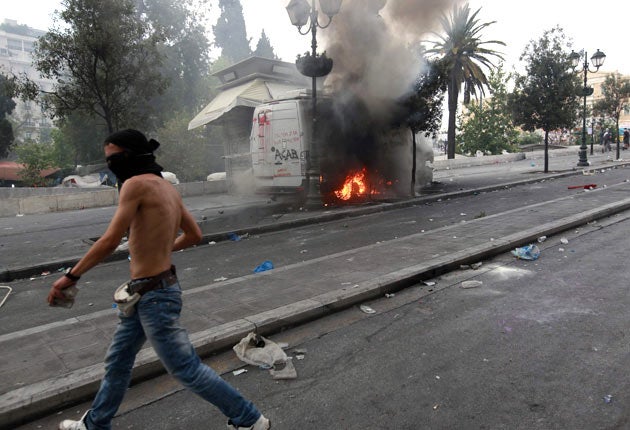
Your support helps us to tell the story
From reproductive rights to climate change to Big Tech, The Independent is on the ground when the story is developing. Whether it's investigating the financials of Elon Musk's pro-Trump PAC or producing our latest documentary, 'The A Word', which shines a light on the American women fighting for reproductive rights, we know how important it is to parse out the facts from the messaging.
At such a critical moment in US history, we need reporters on the ground. Your donation allows us to keep sending journalists to speak to both sides of the story.
The Independent is trusted by Americans across the entire political spectrum. And unlike many other quality news outlets, we choose not to lock Americans out of our reporting and analysis with paywalls. We believe quality journalism should be available to everyone, paid for by those who can afford it.
Your support makes all the difference.Greece faced more strikes and protests today against new austerity measures needed to appease the country's rescue creditors.
Athens metro, tram and suburban rail workers held a 24-hour strike, while buses and trolleys were to stop operating for several hours. Airline passengers also faced delays as traffic controllers implemented work-to-rule action, refusing to work overtime. A 48-hour strike by all transport workers is expected later this week.
Greek police held their own protest, with the Special Guards unit hanging a giant black banner from the top of Lycabettus Hill in the capital reading "Pay day, day of mourning."
Faced with mounting anger from the country's international creditors, the government recently announced a raft of new austerity measures to secure the next €8 billion (£6.95 billion) installment of bailout loans from the €110 billion rescue package it has been dependent on since last year. Without the funds, Greece only has enough funds to see it through mid-October, when it faces the prospect of a messy default.
Debt inspectors from the International Monetary Fund, European Commission and European Central Bank, known collectively as the troika, are expected to return to Athens this week to resume a review suspended earlier this month amid talk of delayed implementation of reforms.
But no specific date has been set for their return, and the European Commission made clear Monday that no decision on releasing the funds would be reached during a meeting of eurozone finance minister in Luxembourg next Monday.
"Yes, I can exclude that," said Commission spokesman Amadeu Altafaj Tardio. He said the troika had to return to Athens first and conclude its mission, and distribute those conclusions to the other eurozone countries before a decision could be made.
"I cannot give you any specific date, but certainly, it is very difficult to imagine that happening by the 3rd of October," he said. He would not say what issues were holding up the troika's return to Athens.
The review's delay leaves Greece only weeks away from a potential debt default.
If Greece doesn't get more rescue loans before mid-October, it will be unable to service its debts or pay salaries and pensions.
Prime Minister George Papandreou heads to Berlin on Tuesday, where he will meet with German Chancellor Angela Merkel ahead of a parliamentary vote there on approving plans to beef up the eurozone rescue fund.
German officials have downplayed prospects of any quick and dramatic change of course in the eurozone debt crisis, such as further increasing the size of €440 billion rescue fund, called the European Financial Stability Facility.
European stock markets rose on Monday on hopes that leaders would consider a new approach.
But Merkel also dismissed talk of allowing a controlled default of Greece, insisting instead on the step-by-step implementation of decisions already taken — but which investors are losing faith with.
In July, when it became clear that Athens needed more help, eurozone leaders agreed on a second, €109 billion bailout, although several aspects of that deal still need to be finalized.
The government's new measures include a new property tax to be paid through electricity bills to make it easier for the state to collect, as well as pension cuts and more tax hikes. Lawmakers are to vote on Tuesday night on the property tax bill, which electricity company workers have threatened not to collect as they say the power utility should not be used as a tax collection system.
Greeks have been outraged by the new steps, as they come on top of previous austerity measures which failed to sufficiently reduce the country's budget deficit.
Hundreds of protesters gathered in the capital's central Syntagma Square on Sunday night, scuffling briefly with police who pushed them back with truncheons and small amounts of tear gas.
AP
Join our commenting forum
Join thought-provoking conversations, follow other Independent readers and see their replies
0Comments